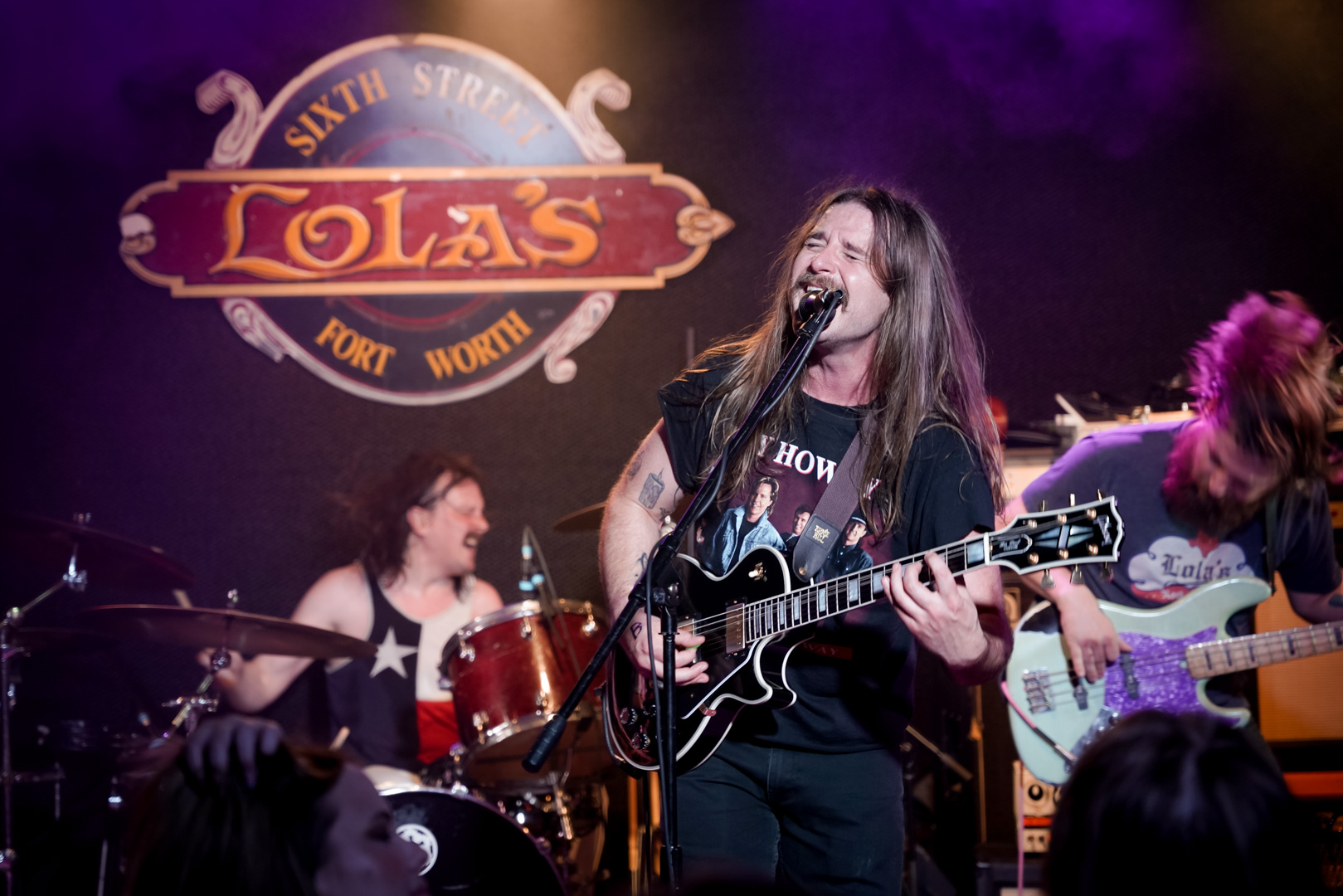
(left to right) Matt Mabe, Nick Tittle and Kris Luther on stage for Lola’s Saloon send-off weekend. Photo: Jessica Waffles
What began as a trickle quickly became a flood in Fort Worth.
On Nov. 26, the Downtown Cowtown at the Isis Theater announced in a Facebook post it was closing. The post, which read in part, “It is with the deepest sadness that we announce, effective immediately, we personally will no longer be operating the theatre.” Jeffrey Smith and Debbie Garrett-Smith oversaw the venue’s renovations and re-opening to the public in 2021.
Then, on Nov. 30, Fort Worth’s Twilite Lounge – an off-shoot of the Deep Ellum spot, which opened its doors in 2017 — announced via Facebook that it would be closing its doors on Dec. 5. Twilite Lounge owner Jimmy Morton told Fort Worth Report that “the budget plan we made a while back, it’s just not working anymore.”
Arguably the most seismic blow was saved for last: Lola’s Fort Worth, a beloved mainstay of the North Texas music scene for nearly 20 years, which had already endured a move from its location near the West 7th district to being a stone’s throw from Texas Christian University, announced in a Dec. 4 Facebook post that it too was permanently dimming the lights — and had already played host to its last night of live music, on Nov. 29.
“It is heartbreaking to announce that after 16 years in business, Lola’s is closing down,” owner Brian Forella wrote in the post. “Fort Worth has been wonderful to us through the years with love and support through thick and thin. … Every single person that has ever been to Lola’s means something to me. We have always felt the love and tried to give it right back.” (Forella did not respond to a KXT request for comment.)
In less than seven days, three Fort Worth venues were shuttered. The visceral, immediate outpouring across social media among the creative class gave the impression of a city and a corner of the music scene in a profound existential crisis — and to be sure, the losses are not insignificant.
“We are so saddened to see the closing of Downtown Cowtown at the Isis Theater, Lola’s and the Twilite Lounge,” said Tom Martens, director of the Fort Worth Music Office, via email. “These independent venues gave opportunities to local performers, provided jobs for hospitality workers, and brought music to their neighborhoods. Each one left an indelible mark on the Fort Worth music scene, and their legacies won’t be forgotten.”
The factors around this particular trio of closings include the COVID-19 pandemic and the economy’s gyrations, which have likely played havoc with the often razor-thin margins with which these bars, clubs and theaters operate. But it’s worth remembering this spate of painful closures is also not the first time Fort Worth’s artistic scene has suffered the loss of stages where artists could congregate and cut their teeth.
The Wreck Room, where numerous punk and rock groups played, was closed in 2007. The Moon, another beloved hub for the city and region’s musicians, shuttered in 2011. The Ridglea Theater, a historic venue off of Camp Bowie Boulevard, nearly leveled and turned into a Bank of America branch, was rescued in 2010 and reopened in 2012, although its bookings are, admittedly, not what they once were. (And let’s not forget other late, great spaces: the Where House, 1919 Hemphill, which shuttered in 2019, or Shipping & Receiving, where Leon Bridges cut his debut LP, which closed in 2020, are just a few.)
While these specific venues will be dormant, live music has not gone silent in the city of Fort Worth.
“One of the best signs of a thriving city is its commitment to its creative communities,” said Martens via email. “Live music venues will continue to help write the next chapter of Fort Worth music. The Post on Race Street, Tulips and the Cicada in the Near Southside, Magnolia Motor Lounge on the west side and Tannahill’s [Tavern & Music Hall] in the Stockyards are featuring a broader range of music than Fort Worth has seen in years.”
There are also robust programs that remain in place to help bolster those remaining spaces, such as Amplify 817, which provides visibility for local musicians, and the Fort Worth Music Office itself, which shares information and resources with musicians to help facilitate performances, recordings, and touring.
Even amid the mourning, and the undeniable loss of gathering spaces deeply loved by those who frequented them, Fort Worth is beginning to look forward.
While the fate of the Downtown Cowtown at the Isis is unclear, and Twilite Lounge has officially closed, the end of Lola’s Fort Worth is a bit hazier.
“The Lola’s Relief Fund” has launched, which offers a bit of explanation about the venue’s demise — “The inability to use the outdoor stage due to an unprecedented scorching summer is the primary factor forcing Lola’s out of its most recent location,” it reads in part — while also alluding to the future: “Brian and the team won’t go out like this… For those of you wanting to invest in recovery efforts and assist in bolstering Brian’s future endeavors, this is your chance.”
Martens said there are plans for the Fort Worth Music Office, in conjunction with the Texas Music Office, to hold a town hall in January to “provide additional information and bring community voices to the table,” as he said via email. Details on that event will be released soon.
Preston Jones is a North Texas freelance writer and regular contributor to KXT. Email him at preston@kxt.org or find him on Twitter (@prestonjones). Our work is made possible by our generous, music-loving members. If you like how we lift up local music, consider becoming a KXT sustaining member right here.














